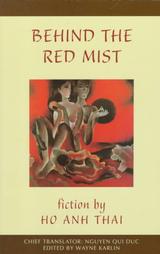Tags
I first encountered Ho Anh Thai’s fiction at it’s fantastical best in the wonderful Whereabouts volume of Vietnam: A Traveller’s Literary Companion, edited by John Balaban and Nguyen Qui Duc. “The Goat Meat Special” in which a man’s boss turns into a goat after watching a delectable TV show of pig pornography, a channel which only shows when the two men are watching alone, gathers its sharpness as, first, the man simply accepts his new station in life, though worrying about being felled by the knife of his employee’s wife, and second as we learn that his own wife has known him as a goat for a long time:
My parents and siblings were full of praise for him [when we met]: he was so handsome and so talented, a General Manager and barely over 30 years old. Only I saw that coming into our house that day was a sharp bearded goat, insensitive to human beings. But I was a spinster of 30 years old and he was my last chance.
Not only does she see her husband as a goat she sees everyone as goats “The houses and the streets are swarming with goats. Goats riding bicycles and Honda motorbikes. Goats sitting in Toyotas.” The story doesn’t go on long enough to become a full force satire but it is a fine example of a tongue-in-cheek description turning into a creative sketch of the human condition — in a post war city beset by commercial and party cronyism.
 Behind the Red Mist, 1998, is made up of 9 short stories, including “The Goat Meat Special,” and the longer, novella length, title story, all written in the 1990s.
Behind the Red Mist, 1998, is made up of 9 short stories, including “The Goat Meat Special,” and the longer, novella length, title story, all written in the 1990s.
If you are going to Vietnam, even if only in a reader’s world, there is plenty of good fiction (here, here and here) available in translation. This slender volume is of particular interest both because the stories are shorter, not full length novels, and because the author is younger than authors of much of the earlier translated work. He was barely of draft age when the American war ended and so, while the war does appear in some of these stories it is not at the center, as war itself.
Which isn’t to say it isn’t there, as a nice piece in Banipal (actually a magazine of Arab literature) suggests:
Born in Hanoi in 1960, Thai was evacuated to a “safe” area in the countryside when the American bombing campaign began. One of his earliest memories was swimming with a group of children and suddenly seeing the American planes bombing the village, then running back with a young girl, to find the house where her parents were staying destroyed and still burning. The image was seared into his eyes, and perhaps stands for the way the tremendous losses of the war generation continue to haunt subsequent generations in Vietnam. It is always difficult for the children of heroes and martyrs to find their own identities, particularly so when they grow up in a country whose severe deprivations call into question the values and methods of their elders. That struggle illuminates much of Thai’s work.
Love is a constant, however.
“When she turned sixteen, Neelam became such an object of infatuation for the village boys that they would fall off the path into the field, or off the shore and into the pond, whenever they caught sight of her.” in “A Sigh Through the Laburnums”
Or
“Everything became blurry when I looked into the face of that girl. In all the far corners of the countryside, I had never seen a face that was so beautiful and so demure… “Please come in and have a drink,” she softly invited me … I was petrified, rooted to the spot.” in “Fragment of a Man”
In “The Indian” and “A Sigh Through the Laburnums” Ho shows off his talents outside his native Vietnam. Both are set in India where he spent six years as a student and with the Vietnamese diplomatic corps. The first conjures up a tale of meeting a man carrying a knapsack he won’t let out of his sight, carrying the bones of love which, as in other stories in the book, speak to the clash between mother’s love and lover’s love. It includes, in a variation on the theme, the ever present trope of ghosts and their influence on our lives. The second, after the sweet beginning (quoted above) takes you to places you can scarcely imagine, even as you know the ‘fiction’ is rooted in the India we can read about in the news today — acid attacks and aborted girls. Likely the most unexpected story in my reading experience.
In the title story, Ho look more directly than in other stories at the Vietnamese war experience –but as a child of that generation. The main character, Tan, is electrocuted and transported back in time to witness Hanoi under fire in 1967 and see the people as they must have been, not through the red mist of patriotic legend that had grown up around them. As an added benefit he is able to play match-maker to his parents, ensuring his own birth.
Reading these stories will make you ready, as I am — and apparently lots of young Vietnamese are: “Ho Anh Thai’s previous stories and novels had already seized the imagination of a young postwar generation. He had become a literary sensation even as a teenager, his fresh, fluid, luminous style capturing the essence of their modern Vietnam” — to take up his later work, including The Women on the Island, 2001 [review] and Apocalypse Hotel (2010) (here)
